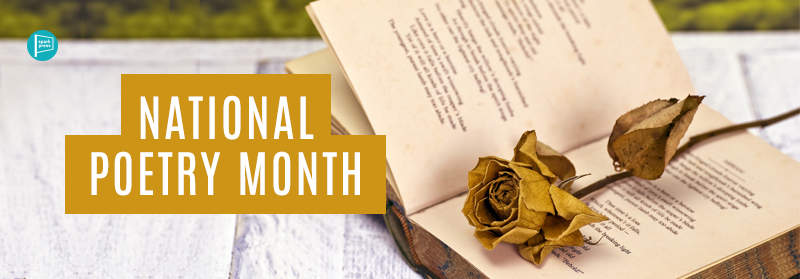
This April we are proudly celebrating National Poetry Month. While poetry is one of the oldest forms of written art, it is ever evolving. It is powerful and popular because it draws on emotions, and helps the audience experience the world in a more interesting way. Poetry holds power, and in many countries, states, and even cities, the title of Poet Laureate may be bestowed on their most impressive, innovative, and accomplished poets.
Poetry Throughout History (and why it matters):
Influential poets throughout history include Emily Dickinson, Walt Whitman, and William Shakespeare. Each of these poets wrote with a unique style, voice, and structure.
Emily Dickinson, for example, rode against the tide of traditional poetry in the 19th century. She defied the rules of poetry, at the time, while showing she knew what the rules were. She used unexpected rhymes, abrupt line-breaks, and unique wordplay to change what it means to write poetry.
Walt Whitman is similar to Emily Dickinson in that he defined the rules for his poetry. They both defied literary conventions proudly, and changed poetry in the process. Walt Whitman varied his line lengths how he wanted, and wrote in a free verse style that was unlike other poets because he did not confine himself to standards of rhythm or rhyming. Walt Whitman has been said to write poetry as if he were an artist and it was his painting. He saw poetry as a visual art, and wrote accordingly.
William Shakespeare is known for being one of the most infamous writers in history, but what many do not know is how he influenced poetry. William Shakespeare created his own form of sonnet, known as the Shakespearean sonnet, that changed the structure and rhythm of poetry. He redefined the art of poetry by using it within his dramas. He showed how art can transcend mediums by using poetry to make points clearer in his theatrical works, which had never been done before.
Often times, we are force fed poetry in academics and told to focus on the structure and craft, so the beauty of the words gets lost in the pages. The poetry that these iconic poets wrote matters because their influence on modern poetry is endless.
Poetry of Today (and how it was influenced by the past)
Today’s poetry comes in many forms, mediums, and structures. Rupi Kaur took the world by storm with her poetry collection Milk and Honey, in 2015. She uses a confessional poetry style throughout the work. Confessional poetry was made famous by Sylvia Plath and Anne Sexton. Atticus, the anonymous poet, became a New York Times best-selling author with his poetry collection The Dark Between Stars. He proudly acknowledges that his writing is influenced by Walt Whitman, Charles Bukowski, Jack Kerouac, Lord Byron, Sylvia Plath, and Maya Angelou. R.M. Drake found inspiration in the art of writing from Virginia Woolf and John Steinbeck but kept his own style in Beautiful Chaos.
These poets all have one thing in common: their main medium is paper. So what happens when you take the paper away? Spoken word poetry is a performance based medium that allows the audience to experience poetry in a more emotional way. Spoken word poetry is the newest iteration of the oral tradition, one of the oldest forms of poetry. It involves using rhythm and cadence to deliver poetic monologues. This performative medium conveys words and emotions in a theatric and compelling way. Spoken word poetry is finding popularity through social media sites such as YouTube and TikTok.
Poet Sarah Kay has become so well-known she has given multiple Ted Talks, not only performing but discussing her craft. Spoken word poetry can portray humor, pain, and love all through the delivery of the performance. She has not only made a name for herself, but revolutionized what it means to be a poet in the modern age.
Poetry is More than Just Rhymes
While poetry often uses rhyming patterns to signify that it is a poem, it is not necessary for it to rhyme. Poetry is about what is being said and how it is being said. Structure can create new meanings. Poetry is about thoughts and feelings, too difficult to convey in proper sentences, instead conveyed in the infinite possible structures of poetry. Poetry is not meant to be proper—it can be, but it doesn’t have to be. It is about connecting to yourself and others.
The beauty of poetry is that you don’t have to rhyme, or fit into a box. Poetry comes in all shapes, sizes, and mediums—and while you may not like poets of the past, you may love poets of today. It is important to remember that poetry is evolutionary. If you don’t love writing sonnets, you might love doing spoken word poetry. During National Poetry month, we urge you to find the poetry you love. Whether it be Bukowski or Kaur, there are many different styles and mediums you can connect to in this genre.

Leave A Comment